Home > The Wind That Shakes the Barley
Edito Cinema-Video Wars and conflicts UK History
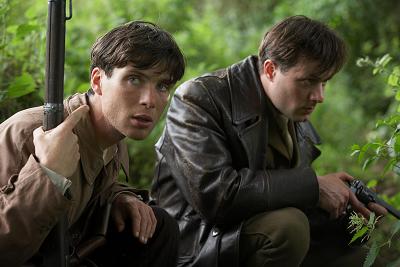
By Ray Bennett
A Ken Loach film about the British in Ireland always has the potential for controversy, but his historical drama "The Wind That Shakes the Barley" is unlikely to inflame passions on either side.
Atmospheric but pedestrian, it is a retelling of the classic tragedy of all civil wars, from the U.S. to Vietnam to England, where brother is pitched against brother.
The film looks handsomely authentic, and the familiar characters are engaging, but the story is predictable and the Irish accents are so thick that subtitles are required. Loach’s humanity is always in evidence, however, and the lack of histrionics will please many, so the film’s conventionality could help make it accessible to general audiences.
The British in the film are nameless cardboard villains used mainly to establish just how horribly occupying forces behave. It’s such a common device to make audiences root for the rebels that Loach and screenwriter Paul Laverty might have been cleverer about it. But it works, and Damien O’Sullivan (Cillian Murphy), who in 1920 is about to leave his Irish village to become a doctor in London, has his fate sealed by two incidents of British brutality that make it impossible for him to leave.
After centuries of domination, the Irish have voted for independence and so the British send in ruthless military squads, known as the Black and Tans, to intimidate the population. Mostly survivors of World War I trench fighting, the soldiers have been brutalized themselves, a point Loach allows to be made.

Damien’s brother Teddy (Padraic Delaney) is a man of action, and he’s devoted to the cause of Irish freedom. Led from afar by the political faction that became the Irish Republican Army, Teddy leads a group of village boys and men who call themselves a "flying column."
Training as guerilla fighters with pieces of wood shaped like rifles, the column spends most of its time trying to steal weapons. These raids bring reprisals that hit not only the rebels but also their womenfolk. Damien’s sweetheart, Sinead (Orla Fitzgerald), has her hair crudely and bloodily sheared in one assault.
The story follows the group through the truce that was declared in 1921 and the Anglo-Irish Treaty signed in 1922 that created the Irish Free State out of 26 counties, with six other counties forming what became Northern Ireland remaining as part of the U.K.
As with all rulers that strive to divide the conquered, the British make sure the Irish Free State remains a part of its empire and require an oath of loyalty to the king. Those who view the treaty as a path to peace, like Teddy, don the British uniform. Those who insist that freedom will only come with complete republicanism, like Damien, continue the fight. Their tragedy becomes inevitable.
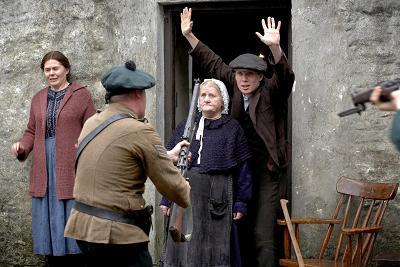
Loach provides plenty of time for arguments on all sides of the political issue, and while that is important, those scenes slow down the film badly. He stages the many action sequences with assurance, however, and draws persuasive performances from his cast.
With his poet’s cheekbones and blue eyes, Murphy makes a fine romantic hero, and Delaney is a match as his duty-bound brother. Liam Cunningham, too, stands out as a thoughtful train driver-turned-rebel. Contributions from cinematographer Barry Ackroyd, production designer Fergus Clegg and composer George Fenton are all first-rate.
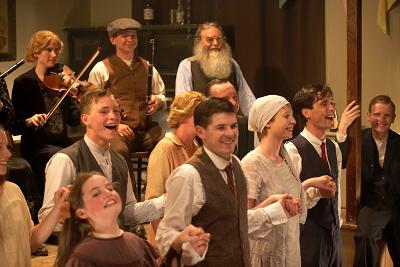
CAST:
Damien: Cillian Murphy
Teddy: Padraic Delaney
Dan: Liam Cunningham
Sinead: Orla Fitzgerald
Peggy: Mary Riordan
Bernadette: Mary Murphy
Micheail: Laurence Barry
Finbar: Damien Kearney
Leo: Frank Bourke
Rory: Myles Horgan
Chris: John Crean
Sir John Hamilton: Roger Allam
Priest: Denis Conway
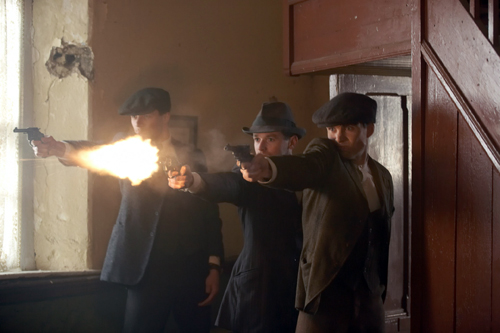
Director: Ken Loach; Screenwriter: Paul Laverty; Producer: Rebecca O’Brien; Executive producers: Ulrich Felsberg, Andrew Lowe, Nigel Thomas, Paul Trijbits; Director of photography: Barry Ackroyd; Production designer: Fergus Clegg; Editor: Jonathan Morris; Composer: George Fenton.
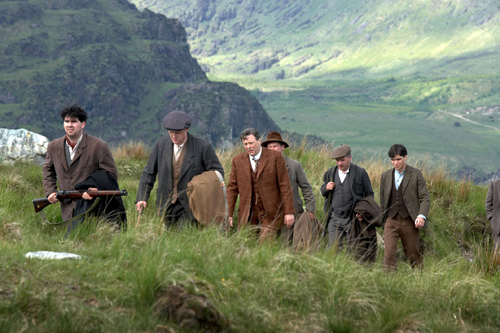
Reuters/Hollywood Reporter





Forum posts
13 June 2006, 05:58
The IRA is a truly heroic army, they fight the Brits!
15 June 2006, 11:39
The IRA are a bunch of murderers that oppress and steal from their own communities and blow little kiddies and their mothers to pieces in the name of their "struggle".
Rightly or wrongly, the majority of the people in Northern Ireland have always wished to remain within the United Kingdom, a wish that no amount of butchery from subversive trash like the IRA could ever alter.
I’m Irish AND British; I was born and raised in Northern Ireland during "The Troubles" and I have seen for myself what misery and heartache the IRA has wrought here, much of which was financed by sentimental, know-nothing Irish Americans in New York who got a little taster of the horrors they’d funded in the "old country" when the twin towers got struck.
19 June 2006, 18:25
Re. the last,
Would you be one of the minority of the Irish who uses the British Army to keep control of part of Ireland against the wishes of the majority of the Irish people and are you part of the community who ran 40,000 guns illegally into Ireland (Larne) in 1913, which compares to the 1450 guns ran into Howth by the forerunners of the IRA in response in 1914? Or do you like to forget that that gambit of illegal act set the context for what was to follow.
Would you be one of the minority of Irish people who have used the threat of violence and an armed militia for 50 years to ensure that your denial of democracy would succeed, and you know that that armed militia committed the most dispicable acts of violence (frequently ignored by the British authorities) against the community. Do you think for even a single moment that that community was going to take all that lying down. You made them hate you and you will reap that harvest (I’m sure there’s a bible quote to support that , and another to argue against it of course). Would you be from the community that lived off the back of your neighbours ensuring that you controlled the levers of power and spending to enrich yourselves at their expense.
The original hate mongers of Ireland are mostly from northern Ireland and it was you guys who "spawned" the modern day IRA, by your sectarianism (a polite word for racism) and intransigent stubborness. The British people (of the mainland as your type so quaintly refer to) will drop you guys so fast once the population demographics throw the switch in another couple of generations. Get real and get a life. You will have to learn to live side by side with Irishmen and when the Celtic Tiger finally swallows you whole you will still have choices (you can stay and get rich again or you can stay British elsewhere).
When nations go to war innocents die and all armies (US, Chinese, British, Russian, French etc.) know that and they would never to go to war if they were not prepared to take innocent life. The IRA was no different and you cannot have a rule that says your side can do it but the other cannot.
21 June 2006, 18:17
To answer your initial question, yes and no. All my life I have been a loyal British citizen who eschewed the idea of a United Ireland, thanks in no small part to my mother’s family’s shabby treatment as Protestants in the Republic of Ireland, where she comes from. But not any more, and for the following reasons:
1. As you rightly say, the UK has no interest in keeping the union and has proactively sought to get rid of us at every opportunity. Why should we be loyal to them and their hateful monarchy in return?
2. I regard the UK government as a very dangerous, Orwellian agency intent on fettering liberty in the name of security, in which regard, it is as bad as if not worse than the US.
3. I abhor the bogus war on terror the UK supports and all the concomitant paraphernalia, such as the propaganda from Tony B Liar and his false pretexts for aggression.
4. I have no regard for the monarchy which I view as indistinguishable from the global elites whose goal is the enslavement of humanity for their own gain. I detest them, their proud ways and their obnoxious system of privilege and honours.
5. The UK is the land of legalised theft. Over 70 tax rises since Tony B Liar came to power, with much more to come. I’d be better off living in small government Ireland with its generous tax laws.
So yes, you’re right, the Irish economy is strong, albeit well subsidised by the EU.
But where you are wrong is when you lambast us Northern Irish as being solely culpable for all the ills in the conflict. Catholics were and are every bit as violently sectarian as the Protestant majority here in NI. And the IRA are most definitely not the freedom fighters their propaganda machine likes to portray them as. They are cold blooded murderers who have butchered women, children, teenage boys, ordinary workers and many other soft "targets" in the name of their struggle. And they steal, extort, sell drugs and participate in every kind of vice imaginable to finance their machine, so please, spare me the rose-tinted view of their shameful activities in this land.
21 June 2006, 18:57
Good posts, and Ireland is a highlighted microcosm of Imperialism that is flourishing today -Iraq, Afghanistan to name but two. However they dress it up, or justify invading another country -it sure as hell pisses off the locals.
They try all the divide and rule tactics -Protestant/Catholic, Shia/Sunni -and all this takes decades to repair. by then the imperialist thief has left with the silver.
22 June 2006, 13:15
Good point re the divide and conquer issue, as I’ve seen it in very close detail here in NI. It’s widely acknowledged here that the British secret service - apart from a period in the 1970s when MI5 and MI6 were at war with each other here - has actively manipulated and laregly controlled both the mainstream Republican and Loyalist paramilitaries. Again and again, we have had high profile exposures of leading IRA men working for the British, culminating in the past month with the claim, albeit strenuously denied by the man himself, that Martin Maguiness, the IRA’s #2, had been a British agent for years. On the other side of the fance, the list of exposed Loyalist agents is much longer.
I wish I had more time to write about what NI has really been about since the beginning of the sectarian conflict in the early 1970s. To summarise, Northern Ireland - or Ulster, as we tend to call it - has been a testing ground for everything horrible and oppressive the NWO has in store for the rest of the western world. Long before Gitmo, NSA snooping, road blocks, draconian airport security, etc., etc. ever became issues in the USA, we had similar / much worse issues here. Some examples:
* Internment - The UK government decided to arrest and detain IRA terrorist suspects without trial. Inevitably, they arrested and detained innocent men as well as genuine perpetrators. However, the outrage caused by the innocent detainees galvanised support for the IRA and garnered worldwide sympathy for their cause. Oh, and it had zero effect on containing terrorist activity; rather, it fuelled, both directly and indirectly as alluded to in the prevous sentence.
* Road blocks - I was born into the conflict, so it was natural for me and many others to be stopped by soldiers as well as police at road blocks. Not once was I ever doing anything wrong; it was simply routine for little old ladies, pregnant mothers, teenage boys, middle aged men, in sum, anyone and everyone to be stopped at random checkpoints set up at any location in town or country, at any time of the day or night, any time of the year. In addition to asking for ID and things like "where are going to / coming from?", I have been asked what I was talking to another driver about, and worst of all, requested to get out of my car and open the bonnet (hood) and boot (trunk), so that they could be sure there was no weapons in it. Yet I was an ordinary citizen with no terrorist background and no criminal record, not even the least motoring offences!!!
* Surveillance - NI has the best high speed internet coverage in the UK, as well as the most advanced phone system. This isn’t because British Telecom wanted to be kind to us, but because the secret service wanted a high tech, ultra-snoopable phone network that could be very efficiently monitored. The bottom line is everyone in NI had their phones and faxes spied on to an extent unmatched anywhere in the western world hitherto. For fun, people used to say things like "AK-47" or "parachute" in phone conversations and wait for the click, which presumably the secret service wanted us to hear by way of intimidation.
* Assassinations - Very interestingly, anyone on eiether side of the conflict who seemed to be, shall we say, "too extreme" or who did not eventually sign up to the present "Peace Process" was elminated. The east Tyrone IRA brigade, widely regarded as renegade and out of the leadership’s control, was mysteriously wiped out by the SAS in a machine gun ambush I heard from my own garden where I was playing as a child. One of the main men in the Loyalist UDA, John McMichael, was murdered too; again, he was not interested in the path to the subsequently agreed peace deal because his only concern was (misguidedly enough, I can now say) preserving the union with the UK.
* Governmental threats - I know a guy who wrote a book extolling the virtues of Ulster becoming an independent sovereign state, with equality for both Catholics and Proestants. His home was burgled and an unambiguous message left from the secret service warning him to back off. I know another guy who was very vocal in defending civil liberties, specifically, the right (as we all saw it at the time) for British citizens to have parades anywhere on British soil. One day a stranger, posing as a policeman, invited him for "a quiet word" and informed him in no uncertain terms that he was a dead man walking. He now lives overseas, having abandoned all notions of "saving Ulster".
* Assaults on Civil Liberties - The experiment in Ulster showed the NWO how to defeat the gun-toting, constitution-quoting, red white and blue patriot. The method is actually frighteningly simple: block his way with massive military prowess whilst continually reminding him, often through the country’s pastors, of his duties as an upstanding, loyal citizen of his country. This is what happened during the parades crisis in Ulster 10 years ago, when the world’s media flocked to see how the Orangemen would react to a military blocakge of their traditional parade route along a Catholic road. Message to all those redneck militia types holed up in Montana or wherever: you are infiltrated at all levels with informers / government agents, and you have no chance as an organised body to do anything to resist them. The time to organise your militias would be AFTER full blooded martial law comes into force, drawing on abilities practiced on an individual, very private level now.
There is much more I could write, and much to be learned from NI for those now worried about what the NWO / Big Brother has in store for the western world, but for now I need to get back to work!
PS - In my haste in my previous post, I forgot to mention that the guns brought into Ireland by the Protestants a century ago were never intended to fight the Catholic Irish; rather, they were acquired to resist the British army imposing a United Ireland. At the same time (and ever since), the Catholics brought their own shipments in. Just as that particular crisis was reaching the boil, war broke out in Europe and the young men who owned those guns were sent to France where they fought - side-by-side with their Irish Catholic neighbours - against the German army. In the end, our small country lost a hideous amount of young men fighting for a perfidious Britain who always looked down their arrogant noses at us. I just regret it took me so long to see this!
22 June 2006, 16:17
Good point re the divide and conquer issue, as I’ve seen it in very close detail here in NI. It’s widely acknowledged here that the British secret service - apart from a period in the 1970s when MI5 and MI6 were at war with each other here - has actively manipulated and laregly controlled both the mainstream Republican and Loyalist paramilitaries. Again and again, we have had high profile exposures of leading IRA men working for the British, culminating in the past month with the claim, albeit strenuously denied by the man himself, that Martin Maguiness, the IRA’s #2, had been a British agent for years. On the other side of the fance, the list of exposed Loyalist agents is much longer.
I wish I had more time to write about what NI has really been about since the beginning of the sectarian conflict in the early 1970s. To summarise, Northern Ireland - or Ulster, as we tend to call it - has been a testing ground for everything horrible and oppressive the NWO has in store for the rest of the western world. Long before Gitmo, NSA snooping, road blocks, draconian airport security, etc., etc. ever became issues in the USA, we had similar / much worse issues here. Some examples:
* Internment - The UK government decided to arrest and detain IRA terrorist suspects without trial. Inevitably, they arrested and detained innocent men as well as genuine perpetrators. However, the outrage caused by the innocent detainees galvanised support for the IRA and garnered worldwide sympathy for their cause. Oh, and it had zero effect on containing terrorist activity; rather, it fuelled, both directly and indirectly as alluded to in the prevous sentence.
* Road blocks - I was born into the conflict, so it was natural for me and many others to be stopped by soldiers as well as police at road blocks. Not once was I ever doing anything wrong; it was simply routine for little old ladies, pregnant mothers, teenage boys, middle aged men, in sum, anyone and everyone to be stopped at random checkpoints set up at any location in town or country, at any time of the day or night, any time of the year. In addition to asking for ID and things like "where are going to / coming from?", I have been asked what I was talking to another driver about, and worst of all, requested to get out of my car and open the bonnet (hood) and boot (trunk), so that they could be sure there was no weapons in it. Yet I was an ordinary citizen with no terrorist background and no criminal record, not even the least motoring offences!!!
* Surveillance - NI has the best high speed internet coverage in the UK, as well as the most advanced phone system. This isn’t because British Telecom wanted to be kind to us, but because the secret service wanted a high tech, ultra-snoopable phone network that could be very efficiently monitored. The bottom line is everyone in NI had their phones and faxes spied on to an extent unmatched anywhere in the western world hitherto. For fun, people used to say things like "AK-47" or "parachute" in phone conversations and wait for the click, which presumably the secret service wanted us to hear by way of intimidation.
* Assassinations - Very interestingly, anyone on eiether side of the conflict who seemed to be, shall we say, "too extreme" or who did not eventually sign up to the present "Peace Process" was elminated. The east Tyrone IRA brigade, widely regarded as renegade and out of the leadership’s control, was mysteriously wiped out by the SAS in a machine gun ambush I heard from my own garden where I was playing as a child. One of the main men in the Loyalist UDA, John McMichael, was murdered too; again, he was not interested in the path to the subsequently agreed peace deal because his only concern was (misguidedly enough, I can now say) preserving the union with the UK.
* Governmental threats - I know a guy who wrote a book extolling the virtues of Ulster becoming an independent sovereign state, with equality for both Catholics and Proestants. His home was burgled and an unambiguous message left from the secret service warning him to back off. I know another guy who was very vocal in defending civil liberties, specifically, the right (as we all saw it at the time) for British citizens to have parades anywhere on British soil. One day a stranger, posing as a policeman, invited him for "a quiet word" and informed him in no uncertain terms that he was a dead man walking. He now lives overseas, having abandoned all notions of "saving Ulster".
* Assaults on Civil Liberties - The experiment in Ulster showed the NWO how to defeat the gun-toting, constitution-quoting, red white and blue patriot. The method is actually frighteningly simple: block his way with massive military prowess whilst continually reminding him, often through the country’s pastors, of his duties as an upstanding, loyal citizen of his country. This is what happened during the parades crisis in Ulster 10 years ago, when the world’s media flocked to see how the Orangemen would react to a military blocakge of their traditional parade route along a Catholic road. Message to all those redneck militia types holed up in Montana or wherever: you are infiltrated at all levels with informers / government agents, and you have no chance as an organised body to do anything to resist them. The time to organise your militias would be AFTER full blooded martial law comes into force, drawing on abilities practiced on an individual, very private level now.
There is much more I could write, and much to be learned from NI for those now worried about what the NWO / Big Brother has in store for the western world, but for now I need to get back to work!
PS - In my haste in my previous post, I forgot to mention that the guns brought into Ireland by the Protestants a century ago were never intended to fight the Catholic Irish; rather, they were acquired to resist the British army imposing a United Ireland. At the same time (and ever since), the Catholics brought their own shipments in. Just as that particular crisis was reaching the boil, war broke out in Europe and the young men who owned those guns were sent to France where they fought - side-by-side with their Irish Catholic neighbours - against the German army. In the end, our small country lost a hideous amount of young men fighting for a perfidious Britain who always looked down their arrogant noses at us. I just regret it took me so long to see this!
23 June 2006, 19:43
Fascinating insight, and although studied Ireland at university from the civil rights marches of 1969 onwards, its nothing like having a first time account.
With regard to media coverage of ’the troubles’, growing up in the UK there was a news item nearly every day. However, there was never, ever, any substantial account of the reasoning behind the violence or any in depth analysis. Just a description of that days bombing or shooting.
As a result, people were totally blase towards what what was going on, and discounted the violence as ’’oh its religion, its those protestants versus Catholics’’ . Inexcusable negligence on the part of the media. Even today I guarantee that 90% of the UK population has no knowledge of Partition, the six counties, or what constitutes Ireland as a whole.
Just to lighten it a bit, a guy who fixes my car, Ulster protestant, said the Irish calender consists of January, February, March, March, March, March.......:-)
26 June 2006, 12:40
Yeah, marching plays a big role in life here, especially in July.
Coming from an erstwhile Loyalist / Unionist position though, I now see the futility of it all. Sadly most people here can’t see the bigger picture, i.e., the globalist agenda for the whole world. I am convinced NI was just a testing ground for what the NWO elitests have in store for the west in general. Even the British Army’s definitive work on fighting in built-up areas (FIBUA) - a blueprint for suppressing civilian armed resistance - was based on experiences (and experiments) in Northern Ireland’s "Troubles".
29 June 2006, 20:40
Sounds interesting. Don’t know too much of this NWO scenario, but there are definite alliances and agreements going on between the rich and powerful that we as the public aren’t informed about.
Ireland a case in point, where deals done behind the scenes sealed the fate of many.
There were lots of stories about Ireland being the testing ground for the riot control/paramilitary policing that may be needed at some point for the UK mainland.
1 July 2006, 22:57
Everything that is happening in the rest of the West was first tested in NI. Martial Law, internment without trial, facing down redneck patriots (the Loyalists), infiltration of organised resistance (the Republicans), assasination of key civilians, fomenting of internecine strife, mass espionage programmes, etc, etc. Clued-up libertarians here have a head start on the rest of the world’s freedom lovers - we know exactly how Big Brother is going to jackboot all over everyone.
2 July 2006, 20:02
It is interesting to think of Ireland as a petrie dish in which the British ruling classes experimented with various techniques of imperialism. Brutality is balanced with civic innovations. For example, where some in the British establishment used famine as a Malthusian tool to address the Irish problem, others decided to give Ireland the world’s first postal system. There are many paradoxical examples.
It is also interesting to think of Ireland as a nation that was interrupted, and then by force of imagination and arms, has begun to bridge the gap between its historic potentials and the profound problems of modern Irish life. In this way I think the Irish are among the world’s first moderns—people who cannot and do not get stuck in tradition and instead reinvent themselves, unburdened by old operating systems. (Because the old operating systems were oppressive, foreign and overcome by the revolutionary/radical change generation, described in the movie.).
The evolution of the peace process is instructive. It shows that the Irish, as moderns, economically successful (due to their successful negotiation with globalization), can be among the key peoples of the next century. The key peoples of the last century led us down the path of nuclear threat. The Irish have emerged to show the world how to put history behind you as a wind at your back. The Irish do not wallow in historical grievance. They emerge from it, determined not so much to escape it, as to give it a better "ending."
The Irish story is epic, because it can serve as a model for other peoples stuck in the cycles The Wind that Shakes the Barley exemplifies. Israelis could learn from it.